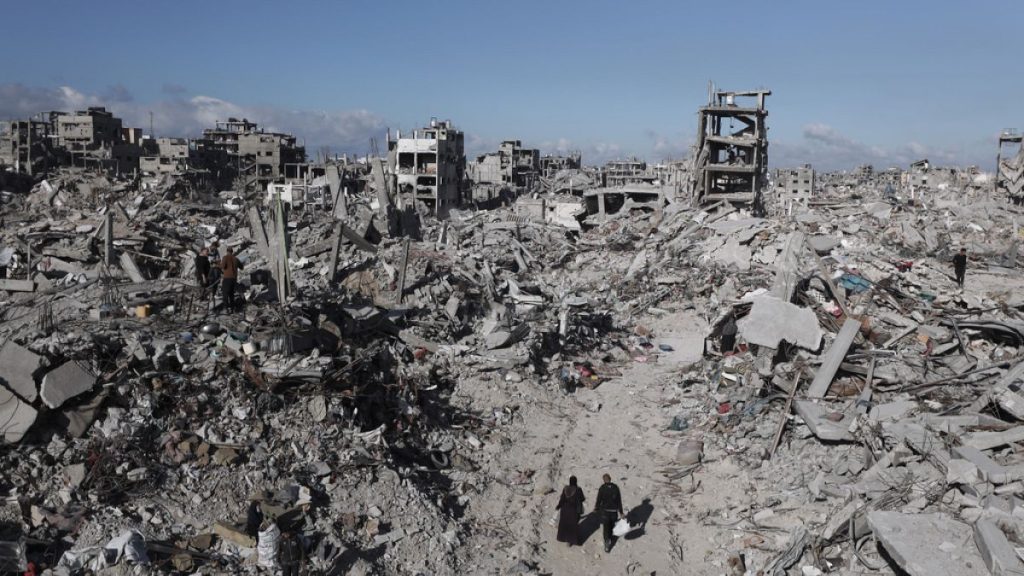The fifteen-month conflict between Israel and Hamas has left an indelible scar on the Gaza Strip, particularly in the Jabaliya refugee camp. As displaced Palestinians gradually return to their homes, they are confronted with a landscape of utter devastation. Buildings lie in ruins, infrastructure is shattered, and the once-vibrant community is reduced to a ghost of its former self. The sheer scale of destruction is overwhelming, with homes pulverized into rubble and the basic necessities of life – water, electricity, sanitation – severely compromised. The residents of Jabaliya, who have endured repeated cycles of violence, are now faced with the daunting task of rebuilding their lives amidst the wreckage. Their stories paint a grim picture of loss, despair, and a future shrouded in uncertainty.
Nizar Hussein’s experience exemplifies the plight of countless Gazans returning to find their homes uninhabitable. The emotional toll of witnessing the complete destruction of one’s home, the repository of memories and a symbol of security, is immeasurable. The sense of displacement and vulnerability is further compounded by the lack of basic necessities. For many, like Nizar, the immediate priority is simply to find shelter, often resorting to makeshift structures cobbled together from salvaged materials. These temporary shelters offer minimal protection from the elements and lack the basic comforts of a home, serving as a stark reminder of the precariousness of their situation.
The long road to recovery is further complicated by the scale of destruction in Jabaliya. The intensity of the bombardment has left the area in ruins, making rebuilding a monumental task. The physical damage to buildings and infrastructure is extensive, requiring significant resources and expertise to repair. Beyond the physical reconstruction, the psychological scars of the conflict will linger, requiring long-term support and healing for the traumatized population. The rebuilding process will necessitate not only bricks and mortar but also emotional resilience and community-building efforts to restore a sense of normalcy and hope.
Hassan, another resident of Jabaliya, embodies the resilience of the Gazan people. Displaced from his home for several months, he has returned to the daunting task of building a makeshift shelter using tarpaulins. Despite the overwhelming devastation and the prospect of years of rebuilding, Hassan’s determination to reclaim his life is evident. His actions reflect a deep-rooted attachment to his home and community, and a refusal to be defeated by the ravages of war. He understands that rebuilding will be a long and arduous journey, but he is committed to making a start, however small.
The story of Jabaliya is a microcosm of the broader challenges facing Gaza in the aftermath of the conflict. The widespread destruction of homes, infrastructure, and livelihoods has created a humanitarian crisis of immense proportions. The international community has a crucial role to play in providing immediate relief and supporting long-term reconstruction efforts. However, beyond the provision of material assistance, addressing the underlying causes of the conflict is essential to preventing further cycles of violence and ensuring lasting peace and stability in the region. A sustainable solution must address the root causes of the conflict, promote dialogue and reconciliation, and create conditions for a just and durable peace.
The resilience of the Gazan people, exemplified by individuals like Nizar and Hassan, is a testament to the human spirit’s ability to endure even the most challenging circumstances. However, resilience alone is not enough to rebuild a shattered community. International support, both materially and politically, is crucial to ensure that the people of Gaza have the resources and opportunities they need to rebuild their lives and their future. The task of rebuilding Gaza is not merely a matter of reconstructing physical structures; it is about rebuilding lives, restoring hope, and creating a future where peace and prosperity prevail.














